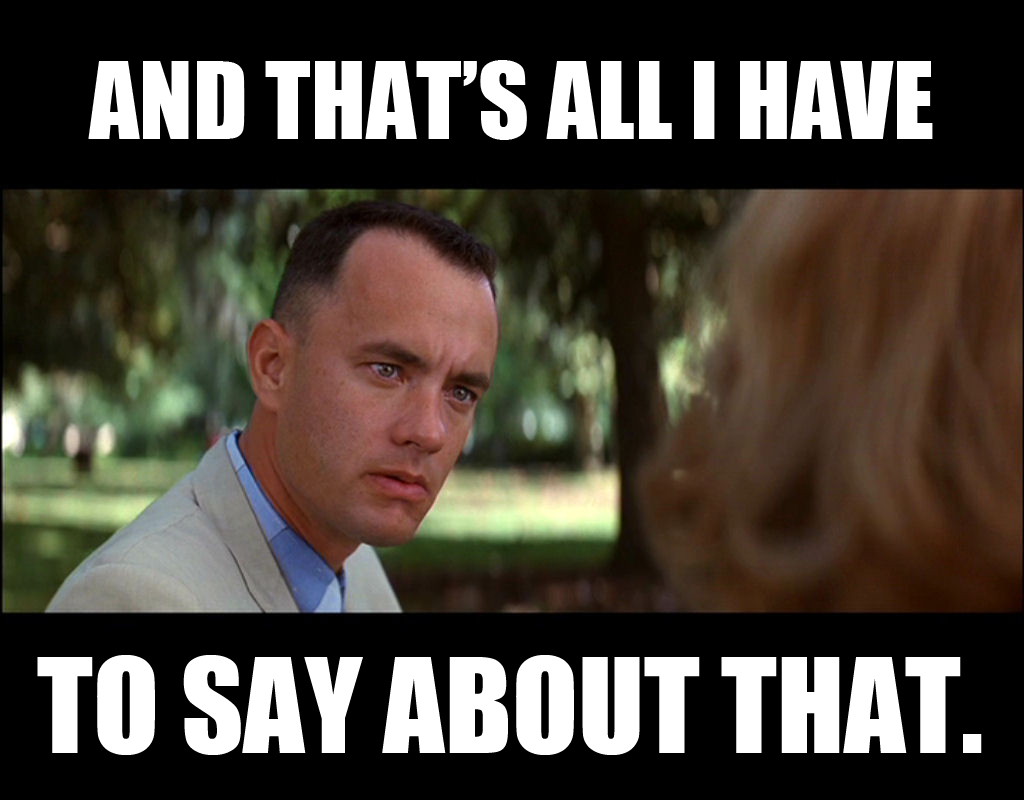Kerri Battles the AFI’s Top 100 — #76: Forrest Gump

In July of 1994, an event occurred that irrevocably altered the world as we knew it. Girls named Jennifer cringed at the way their nickname — preferred or not — was now pronounced by all. People began comparing daily life to a Whitman’s Sampler. And never again would anyone be able to casually pick up their pace in public without the fear that someone nearby would yell, “Run, Forrest! Run!” The whole planet had been Gumped and, to this day, we’re still dealing with the repercussions. I’ve lived in a world without and a world with Forrest Gump. For my money, I’ll take the post-Gump world any day of the week.

Well. No. Not really. I mean. Whatever, just keep reading.
Forrest Gump is the eponymous tale of Greenbow, Alabama’s local idiot, his mother, his best friend and true love, and the breeze that blew his life in precisely the right direction. With an IQ of just 75, Forrest gets by on his kindly and literal view of the world, as well as his ability to run like the wind blows. His speed gets him into college on a football scholarship and saves him and some of his fellow soldiers in Vietnam. His courage — disguised as stupidity — earns him the Congressional Medal of Honor. His sense of honor and morals lead him to financial gain in the shrimping business and his desire to care for his friends leads them to ensure he’s cared for, as well. His fantastic and surreal life places him at or near some of the most turbulent and brutal events of the 60s and 70s, and allows the audience to see these emotional and powerful events through his simple and optimistic eyes. In the end, his optimism pays off and he marries his true love — if only for the short time before her death — and lives on to raise their son.

I can’t explain all this in one paragraph. JUST WATCH THE MOVIE.
In 1994, CGI effects were still in their infancy. Pixar hadn’t quite shown us what they could do with cartoons and everyone else was dipping into the well only sparingly because, well, just go watch what George Lucas did to the Original Holy Trilogy only three years later. But Forrest Gump did something that left the movie-going masses aflutter — it altered history. Instead of hiring look-alike actors to portray presidents or celebrities in fictionalized reenactments of momentous events, Robert Zemeckis inserted Tom Hanks (almost) seamlessly into existing archival footage. Sure, 20 years later, the seams catch your eye just a bit, but in 1994, it appeared as though someone had finally perfected the flux capacitor and was using it for the selfish purpose of creating guaranteed box office gold. Of course, Zemeckis didn’t just alter history — he also effectively and believably stole Gary Sinise’s legs. Chroma Key — green screen to you and me — wasn’t new technology in 1994. However, combining it with the newly available CGI techniques allowed Gary Sinise to play a double-amputee who could actually be seen on-screen leaving his wheelchair unaided. With 34 battles under my belt, I know that cutting edge technology like this is probably enough for the AFI to recognize a given film. Thankfully, cool tech isn’t the only thing Forrest Gump has going for it.

Watch this and tell me you don’t think Gary Sinise is just really method and had his legs removed.
When Forrest Gump was released in theaters, record stores had evolved into music stores because they mostly sold cassettes and CDs, but they still very much existed. 12 at the time, these stores were rapidly becoming my favorite place to spend an afternoon, but my CD collection was still very small and very weird. My first CDs were Boyz II Men – Cooleyhighharmony and Green Day – Dookie. I didn’t know what I was doing or where to go now that I had outgrown my NKOTB and MMC tapes. Thankfully, my older and wiser sister was home from college that summer and had brought with her the Forrest Gump soundtrack. These 2 discs became the soundtrack to my summer that year and, ultimately, my primer to the evolution of rock music. In just 36 tracks, I had inadvertently found the tools that would allow me to connect the dots from the golden oldies my mom favored to the unwashed dudes from the Pacific Northwest that were currently and angrily monopolizing my FM dial. From Aretha Franklin to The Doors to The Supremes to Creedence and The 5th Dimension (just to name a woefully incomplete few), the Forrest Gump Original Motion Picture Soundtrack is perhaps the most expertly comprehensive movie soundtrack to ever be compiled. In a decade where movie soundtracks were sometimes far better than the movies themselves (Singles, I’m looking at you …), that’s no small feat. Still, it’s only part of why Forrest Gump is guaranteed to be an immortal piece of the Pop Culture Hive Mind.

Every great movie has at least one iconic, recognizable scene by which it’s known. King Kong on the Empire State building. Ben-Hur’s chariot race. Sometimes there’s even a catch phrase of sorts that you’ll talk along with each time you watch, like, “Frankly, my dear, I don’t give a damn!” or, “You can’t handle the truth!” Even the great movies are lucky to have more than one or two of these scenes. Forrest Gump, however, is 142 minutes of nothing but these scenes. From the first shot of that feather floating down to the ground to the last shot of it floating back into the sky, there’s not a single scene in the movie that isn’t a least a little bit quotable or worthy of a reference in everyday conversation. Every minute viewing is spent thinking either, “Ooh! Yes! We’re almost at the scene where–” or, “Shhhhh!!! It’s the part!!” From charming to sweet to funny to gut-wrenching and any of the thousands of emotions in between, every second of the film is engaging and engrossing. Forrest Gump is such an impeccable example of storytelling that, when I found out a few years ago that it was actually based on a novel, I didn’t immediately try to read the original. Yes, that’s right — I think this movie is so good that I can’t possibly see how reading the book could improve it. The AFI definitely made the right choice with this one, even if they low-balled it way down at #76. — KSmith
